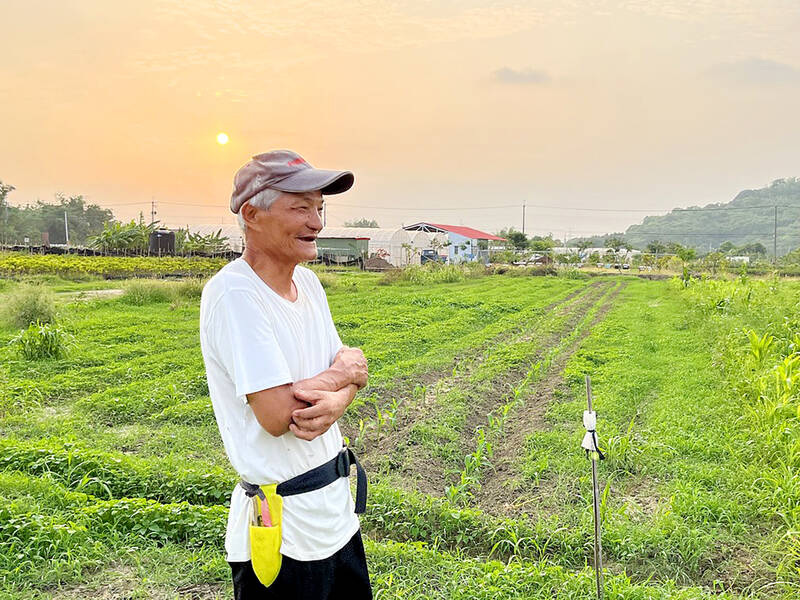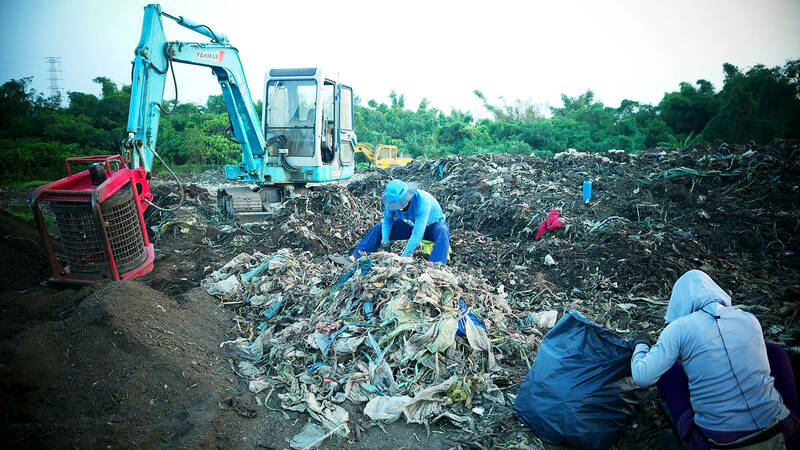This is a film about two “fools,” according to the official synopsis. But admirable ones.
In his late thirties, A-jen quits his high-paying tech job and buys a plot of land in the countryside, hoping to use municipal trash to revitalize the soil that has been contaminated by decades of pesticide and chemical fertilizer use.
Brother An-ho, in his 60s, on the other hand, began using organic methods to revive the dead soil on his land 30 years ago despite the ridicule of his peers, methodically picking each pest off his produce by hand without killing them out of respect for nature.

Photo courtesy of Activator
This documentary is Yen Lan-chuan’s (顏蘭權) follow up to her acclaimed 2004 work Let It Be (無米樂), which followed the daily labor and lives of three elderly farmers in Tainan. That film was an unexpected hit and brought much attention to the state of Taiwan’s agriculture — in fact A-jen’s interest in farming was partially inspired by the documentary. Soul of Soil continues the theme but hones in on the degradation of Taiwan’s arable land.
“When I shot Let It Be, I saw the farmers’ attitude toward life, how they respect the heavens and love the land ... But I did not take the time to touch the soil — I did not know that Taiwan’s soil is sick.” Yen says on the film’s official page.
The film is quite long at 143 minutes, but the slow, laborious pace accentuates the Sisyphean persistence of the two idealistic protagonists, who meet up from time to time to discuss their methods and progress. The narrative is divided into four seasons with footage filmed over the course of six years, giving the audience a raw, poignant look at how A-jen and An-ho change as their quest goes on. But most of all, it’s the colorful personalities of the two that carry the show.

Photo courtesy of Activator Marketing Corp
A-jen is animated and awkward, he smokes a pipe and curses, constantly switching between Mandarin and Hoklo (commonly known as Taiwanese). He breaks out into laughter whether he’s excited, despondent or buried in garbage. His wife and two children help out when they can, and although they don’t fully approve of what he’s doing, they point out that he’s become a much happier and attentive person since he made the life change.
With only a few teeth left in his mouth, An-ho is more of a calm presence, but he’s undoubtedly quirky and has an interesting past as he didn’t begin farming until his 30s. Instead of environmental concerns, his ethos is simply inspired by the Taoist belief that all organisms are connected and should be respected. An-ho is very direct and no-nonsense, resulting in some funny one-liners. His family is also spotlighted as he is having trouble getting his children to continue his work.
What connects them is not just the soil, but their genuine, almost child-like determination to pursue their ideals, no matter the hardships they encounter.
With these two carrying the show, even a topic like soil revitalization becomes watchable for more than two hours. However, it feels as though a lot more problems with agriculture could be discussed, even marginally, such as the common practice of monocropping. In 2018, for example, A-jen’s entire field of pineapples were rendered unsellable because the market collapsed, and he suffered greatly because that’s the only thing he grew. An-ho’s dates also didn’t pan out one year, causing him huge losses. Furthermore, monocropping upsets the natural balance of the soil and depletes it of nutrients and organisms, which seems to defeat the original purpose. None of this is brought up.
Nevertheless, the state of Taiwan’s soil is a crucial topic to bring to light, especially as we face the threat of climate change and food shortages. This film accomplishes that in a heart-rending way that leaves an enduring impression. But where do we go from here? Very few people are willing to do what A-jen did, plunging his entire life and family into something seemingly without doing much planning or business strategizing. And An-ho’s life view and methods are not palatable for any of his five children, who just want to enjoy their lives. Meanwhile, government projects such as science parks and real estate developers continue to buy up the land.
The serene, folksy soundtrack was produced by “wandering bard” Chen Ming-chang (陳明章) and other experienced film scorers, with the theme song by Yang Ta-cheng (楊大正), lead singer of popular band FireEx (滅火器). Kuo Hua-jen (郭華仁), the former head of National Taiwan University agronomy department and current professor emeritus, served as consultant for the film.

Following the rollercoaster ride of 2025, next year is already shaping up to be dramatic. The ongoing constitutional crises and the nine-in-one local elections are already dominating the landscape. The constitutional crises are the ones to lose sleep over. Though much business is still being conducted, crucial items such as next year’s budget, civil servant pensions and the proposed eight-year NT$1.25 trillion (approx US$40 billion) special defense budget are still being contested. There are, however, two glimmers of hope. One is that the legally contested move by five of the eight grand justices on the Constitutional Court’s ad hoc move

Stepping off the busy through-road at Yongan Market Station, lights flashing, horns honking, I turn down a small side street and into the warm embrace of my favorite hole-in-the-wall gem, the Hoi An Banh Mi shop (越南會安麵包), red flags and yellow lanterns waving outside. “Little sister, we were wondering where you’ve been, we haven’t seen you in ages!” the owners call out with a smile. It’s been seven days. The restaurant is run by Huang Jin-chuan (黃錦泉), who is married to a local, and her little sister Eva, who helps out on weekends, having also moved to New Taipei

The Directorate-General of Budget, Accounting and Statistics (DGBAS) told legislators last week that because the Chinese Nationalist Party (KMT) and Taiwan People’s Party (TPP) are continuing to block next year’s budget from passing, the nation could lose 1.5 percent of its GDP growth next year. According to the DGBAS report, officials presented to the legislature, the 2026 budget proposal includes NT$299.2 billion in funding for new projects and funding increases for various government functions. This funding only becomes available when the legislature approves it. The DGBAS estimates that every NT$10 billion in government money not spent shaves 0.05 percent off

Dec. 29 to Jan. 4 Like the Taoist Baode Temple (保德宮) featured in last week’s column, there’s little at first glance to suggest that Taipei’s Independence Presbyterian Church in Xinbeitou (自立長老會新北投教會) has Indigenous roots. One hint is a small sign on the facade reading “Ketagalan Presbyterian Mission Association” — Ketagalan being an collective term for the Pingpu (plains Indigenous) groups who once inhabited much of northern Taiwan. Inside, a display on the back wall introduces the congregation’s founder Pan Shui-tu (潘水土), a member of the Pingpu settlement of Kipatauw, and provides information about the Ketagalan and their early involvement with Christianity. Most